The local transportation and logistics network is facing unprecedented challenges as the spread of Covid-19 gains momentum, in particular, as a multitude of South African companies are dependent on an integrated global trade network to remain profitable.
In the face of a decline in international commerce across industries and a stunted global supply chain, what measures should transport and logistics companies put in place to mitigate the complex and ever-changing obstacles this national disaster presents?
Mixo Kobe, CEO of Mixcorp, believes that when a disaster strikes, business can no longer continue as usual. "We are operating in unchartered territory, and we cannot say for sure how long the industry will continue to be disrupted by the coronavirus. As such, agility is key and it is critical that businesses take a proactive approach to ensuring business continuity. Every major industry is dependent on transport and logistics to operate, so we must do everything we can to adapt. The provision of essential services must continue in order to keep the economy afloat."
For this to be successful, leaders must have an action plan in place to mitigate potential risks and remain operational, while communicating that plan consistently and transparently to clients, stakeholders, employees and other parties integral to the supply chain.
Kobe says: "The survival of businesses at this time is dependent on strong, decisive leadership. This means taking the necessary operational precautions and aligning closely with government to ensure that we are not only compliant, but productive during the state of lockdown."
Implementing preventive measures
According to Kobe, changes must be implemented across operations within the transport and logistics industry. "Our first port of call was to implement preventative measures to prioritise the health and safety of our employees. A highly skilled workforce is operating at the forefront of this pandemic, and every new procedure we have implemented is focused on ensuring the wellbeing of our staff.
"As logistics workers work in highly labour-intensive space, we have enforced social distancing at integral parts of the production line. The health officer and safety officers on each shift exercise regular temperature monitoring, and emphasise cleanliness and limiting human contact. Eskom has also compiled a generic operating procedure to educate the industry on how to remain efficient."
Strengthening strategies
As can be expected, the commodities and manufacturing industry pace has slowed considerably in terms of output, and logistics suffers the consequences. "With regard to Mixcorp’s operations, we are keeping our primary supply chain of coal running, but some disruption is inevitable. Readjustments are necessary, such as managing decreased coal outputs from mines due to their own Covid-19 procedures, and longer turnaround times in loading transport containers."
Kobe concludes that this is not a death sentence for the logistics industry, but rather an opportunity. "Unprecedented events means that we need to operate in reconsidered ways in order to survive.
"In response to this pandemic, I foresee the logistics industry adapting to the Fourth Industrial Revolution at a far quicker pace. It is important that we cast our gaze beyond the lockdown and have strong and responsive business continuity strategies in place to meet the extraordinary challenges the global logistics industry faces."
































